Like many of our favorite stories, this one, too, begins with its main character at the end of her emotional rope. Here, our unknowing protagonist lies fetal on an unwashed sidewalk of Los Angeles, having succumbed to exhaustion and stress, relinquishing herself to the street. She lay in catatonic wonder of her place in the universe, unsure if she could muster the courage to get up again. Perhaps unexpected is that this tableau plays a critical role in one of the city’s most remarkable entrepreneurial stories. On that fateful day in March of 2012, Daina Slekys peeled herself off the sidewalk and took the first steps of an exceptional journey.
In the months prior, she and two close friends, Justin Trout and Vanessa Dew had been maintaining a table at their local farmers’ market in Brentwood, California. On an itsy scale, they were slinging home-brewed-and-bottled batches of the then ultra-niche, alchemic probiotic known as kombucha. Though sales remained small, each week they sold a few more bottles than the last––word was clearly spreading. Then, they arrived one Sunday morning to the sight of an unprecedented phenomenon: a crowd of people had formed an anticipatory line, eager to get their hands on a bottle. Soon, shop owners from around L.A. were looking to stock their tea. Their intention was never to start a beverage company, but their sudden traction inevitably encouraged the birth of a business; Health-Ade Kombucha was officially in its infancy.
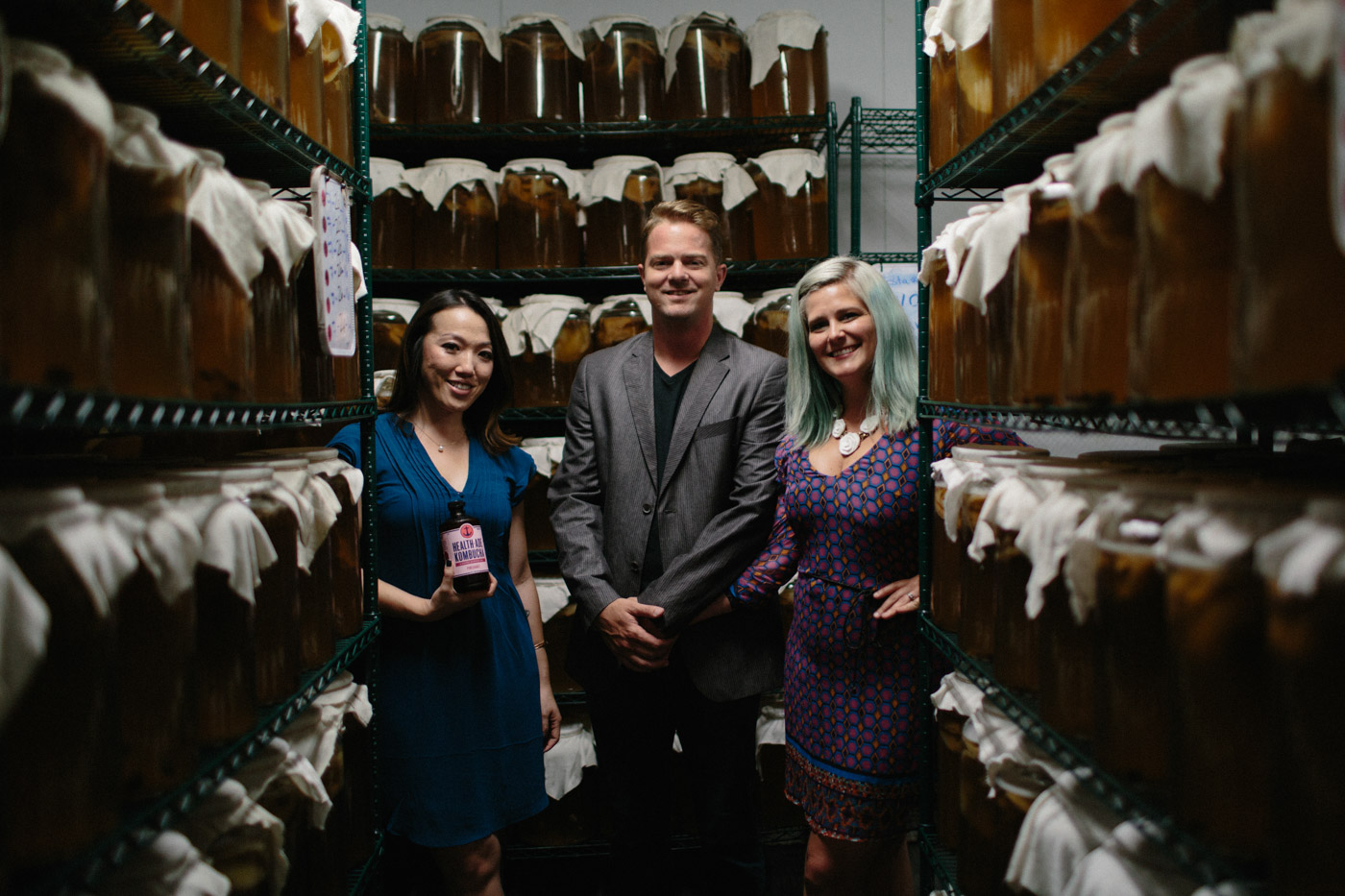
The origin of kombucha is disputed, if not muddled. A multitude of tales abound, all of which are actually kind of awesome: during China’s Qin Dynasty (220 B.C.), every household was believed to have a brewing jar of “The Tea of Immortality”; in 414 A.D., a Korean doctor brought the magical elixir to Japan to cure Emperor Inyoko of his digestive problems. Upon salvation, the dazzled Emperor issued edict that all of his samurais carry a flask of this restorative miracle drink. Even Genghis Khan and his armies kept some ‘buch around to bolster the chutzpah required for a Eurasian massacre. Fast forward to the common era, and the fermented tea known as kombucha has fully broken into the mainstream.
As prehistoric as the practices may be, in today’s culinary world, fermentation feels like a new frontier. Fermentation is all the rage these days, with countless chefs consumed by curiosity establishing clandestine research labs. Most will deny their existence, given that the intentional rotting of food makes bureaucratic heads explode at the FDA and Health Department, but fermentation has proven to have a staggering health-to-taste relationship. In the case of kombucha, the fermentation process results in a concoction sparkling with a singularly bright effervescence. The overall taste is pleasantly nuanced, if not jolted, by its sharp acidic finish––as if fresh fruit salad was soured into cider and refreshed with beaming sparkling water.
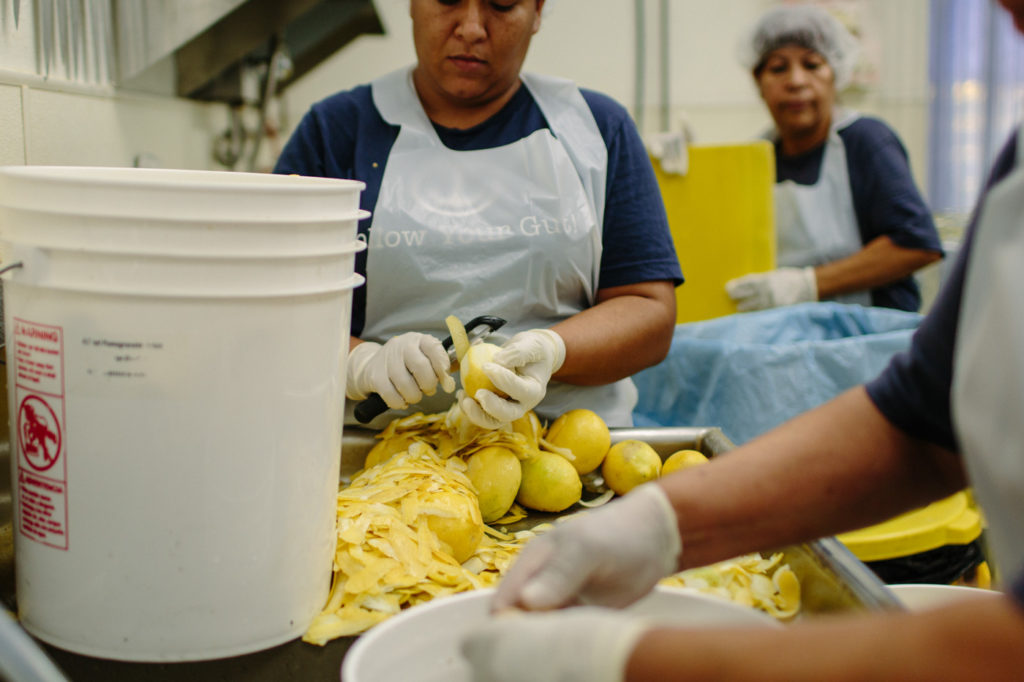
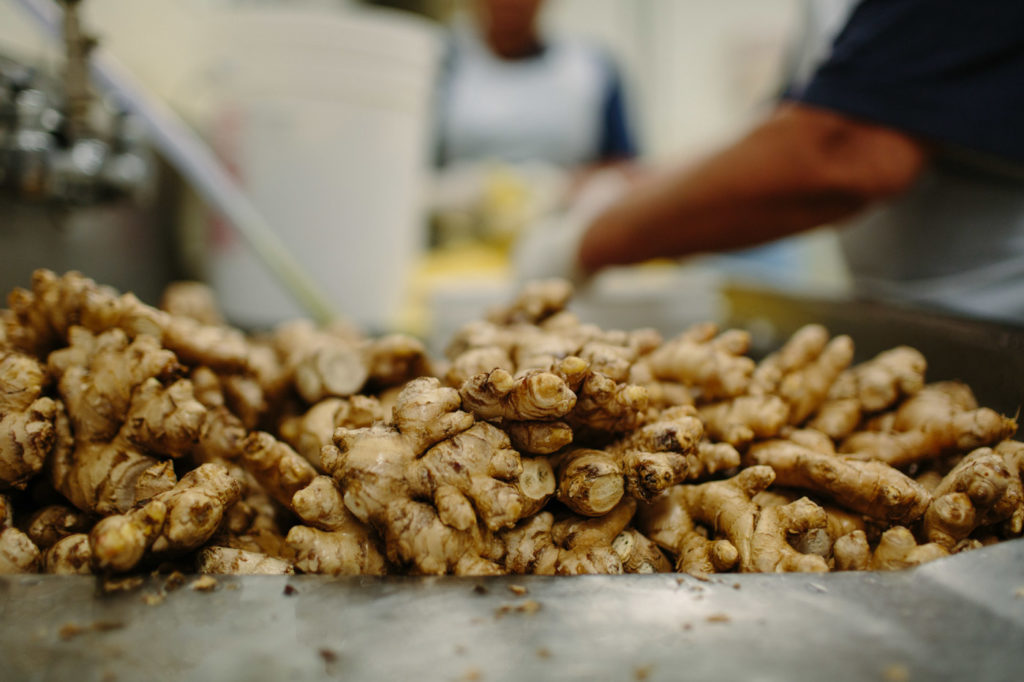
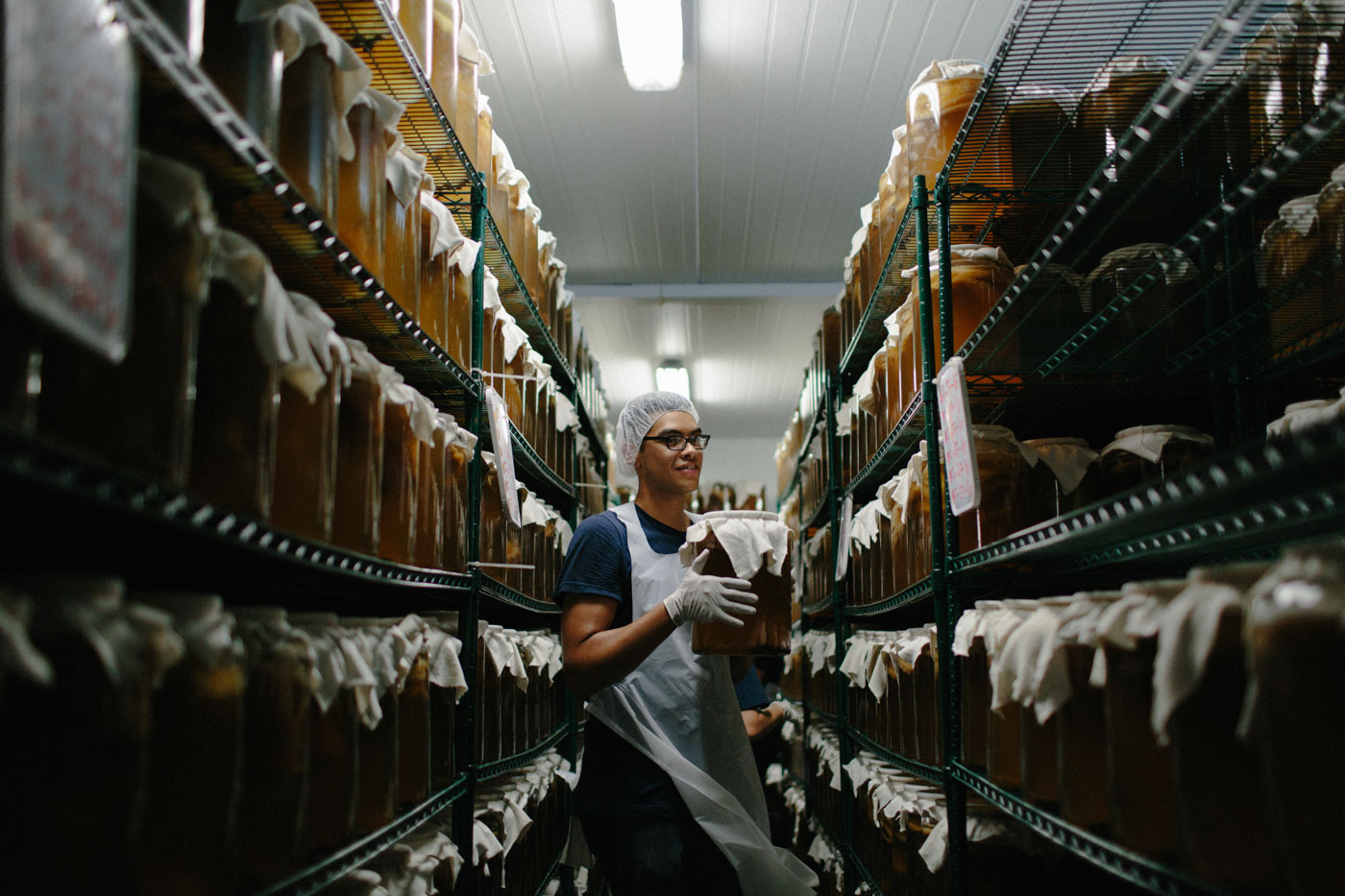
One of the many altruistic forces driving Health-Ade is also its raison d’être; the reason Slekys was home-brewing in those early farmers’ market days was that Trout was in the midst of a lifelong battle with digestive illness, leaning on a cocktail of harsh pharmaceuticals to only mildly temper his condition. Slekys, a nutritional biochemist, asked him to trust his health to her for six months. At the core of her alternative therapy was kombucha, in which the symbiotic culture of bacteria and yeast produce a plethora of probiotics (improved gut bacteria) thought to regulate digestive function. In this case, it worked. Every bottle of Health-Ade has since been stamped with their adopted mantra, follow your gut.
This credo, rife with double meaning, has also been Slekys, Trout and Dew’s entrepreneurial ethos. A few months into their farmers’ market endeavor, the trio was on the verge of collapse, working themselves raw to meet growing customer demands, educating themselves on the intricacies of running a business, pouring over food safety laws––all while maintaining their day jobs. It was at this moment that Slekys found herself collapsed from exhaustion on that fateful sidewalk. When she did rise, she convened a meeting where she and her friends confronted the decision they faced: succumb to the fear of possible failure, or veer from current paths and pursue a new passion? In an industry in which a beverage startup capital requirements average $5 million, the trio’s $3,000 credit card loan and nonexistent business acumen could have spelled swift decapitation. Even Dew’s mathematician parents built spreadsheets to deter the plan. As she remembers, “They were not merely ambivalent in their opposition, they were passionately, vehemently against it.” In this instance, they listened to their guts––which advised them to eschew rational thought. In so doing, the group hit the turbo button, sending them into a meteoric ascent.
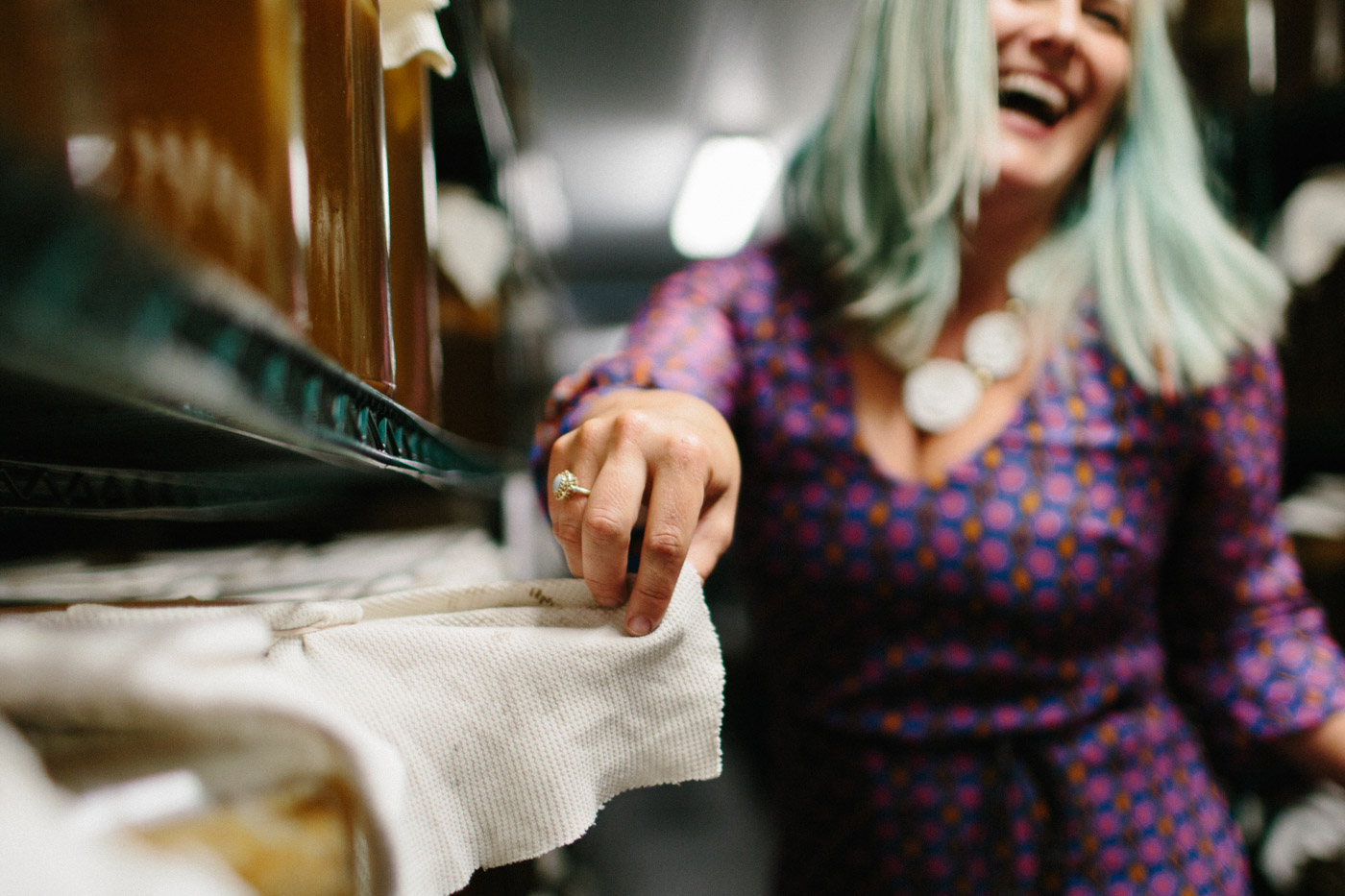
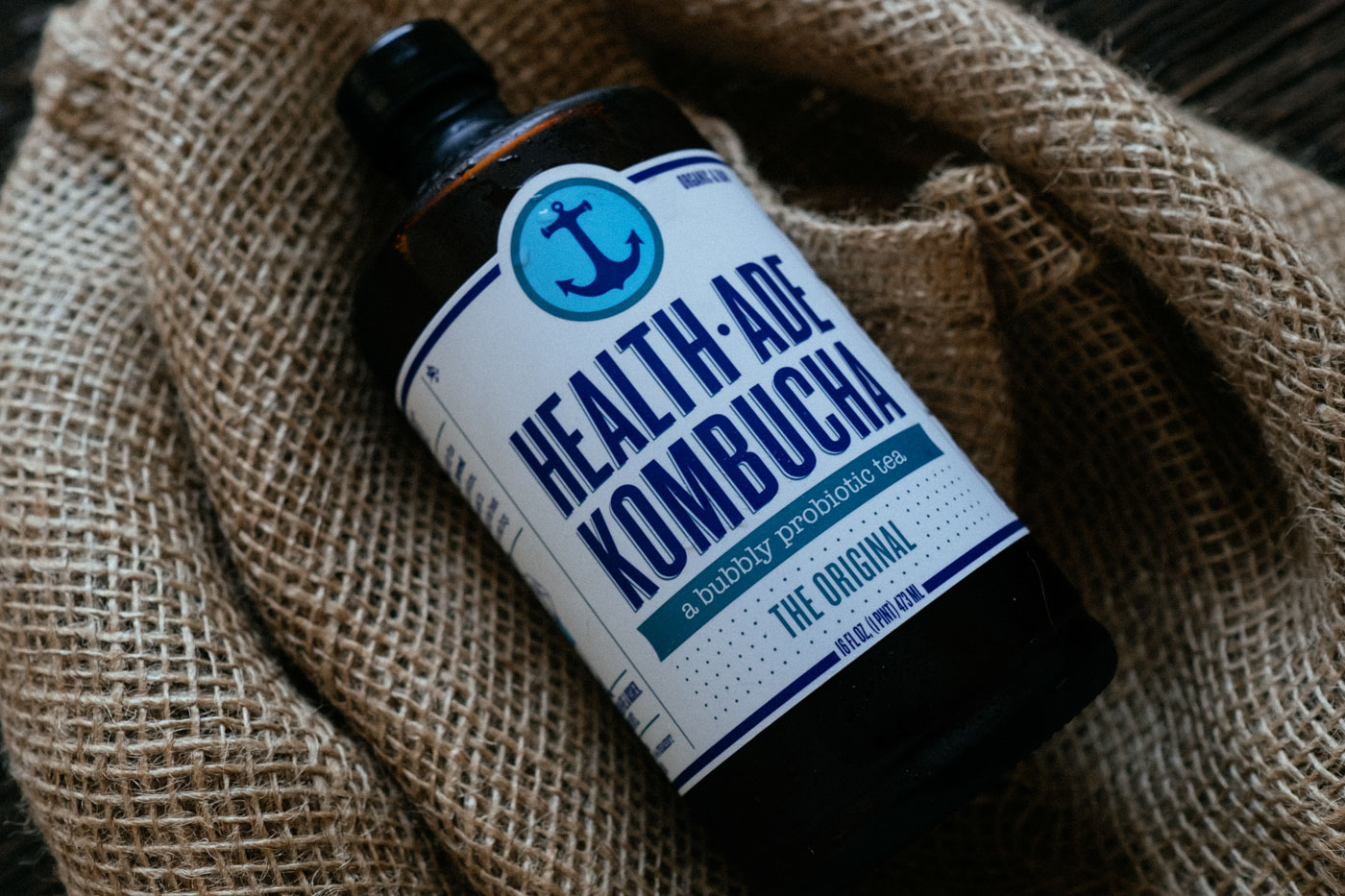
Trout recalls being “bucked off the horse a thousand times.” Fueled by an obsessive desire to create a product that could help people, they never wavered, rising stronger each time. Despite headache, heartache and the intense psychological stress of being thrust into entrepreneurial leadership, good fortune finally found them. In March of 2013, barely a year after their first sale, they received a call from Erewhon, an early pioneer in health-food stores. A place on their shelves means the instant embrace of a militant health-oriented community. Whole Foods followed suit, offering nation-wide sales.
While order sheets have radically changed, the mentality has remained strikingly still: the team at Health-Ade continues to give zero cares about how things have been done prior, or how they’re “supposed to” conduct business, instead measuring decisions through their own prism of integrity and instinct.
The founding principles are intact. The same glass jars they would collect from Bed, Bath & Beyond (hustling 20 percent off coupons from neighborhood mailboxes) are still at the core of their small batch process. The basic composition of kombucha is quite simple: green or black tea, water, sugar, fruit (if desired) and a culture of bacteria and yeast, known as a SCOBY, which catalyses the fermentation. The purity of ingredients and an almost worshipful respect of the small batch fermentation process was Health-Ade’s path to creating a product of which they could be truly proud. By contrast, a large percentage of mass-produced kombucha is made from commodity and GMO ingredients stewing in massive steel vats, with the weeks-long fermentation process hacked down to minutes via forced carbonation. Not so at Health-Ade. Their dojo is endless serpentine rows of 2.5-gallon glass jars filled with the highest quality organic ingredients, sourced locally (ironically, their stall neighbor at the farmers’ market, Gene Etheridge of Etheridge Farms, now grows all of their pomegranates). In an homage to kombucha’s mythical constitution, classical music plays endlessly throughout the space, the delicate sound waves reverberating through the jars, nourishing the living organisms within.

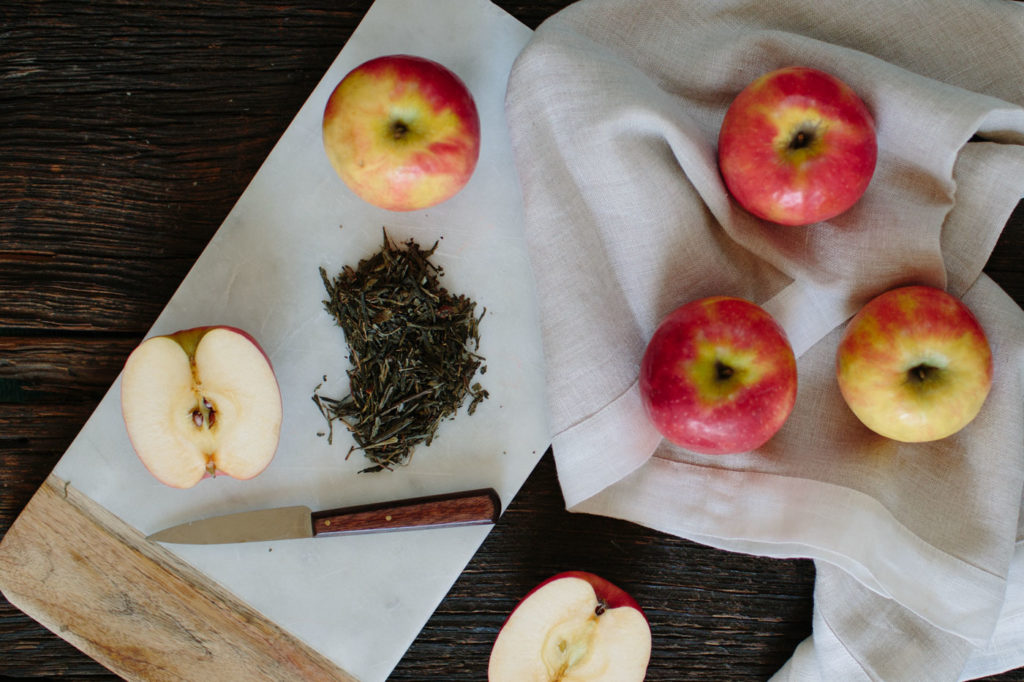
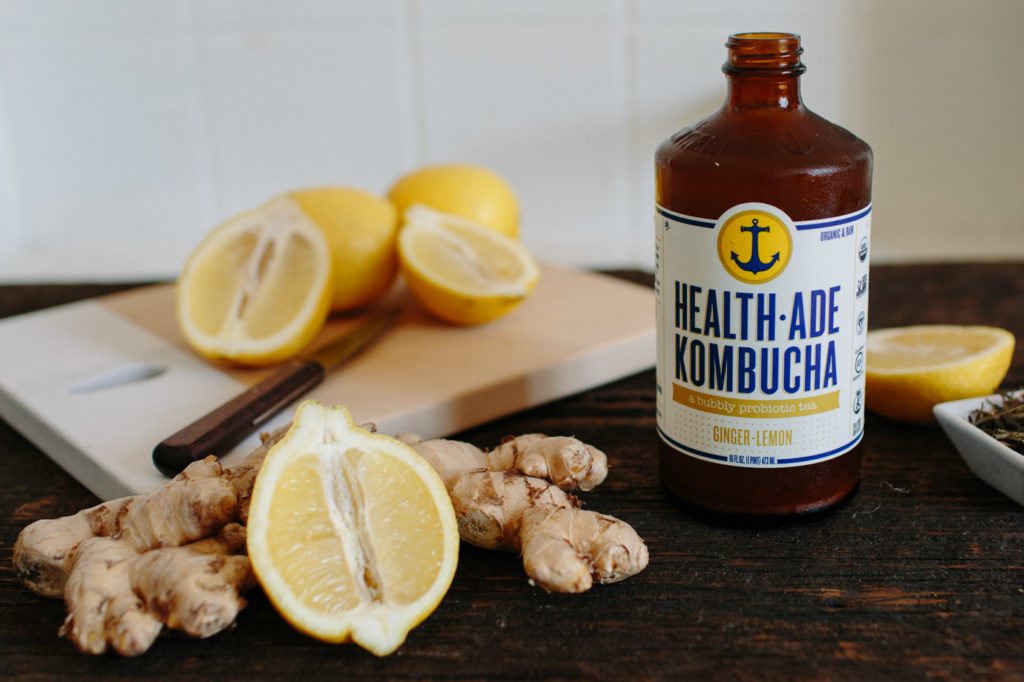
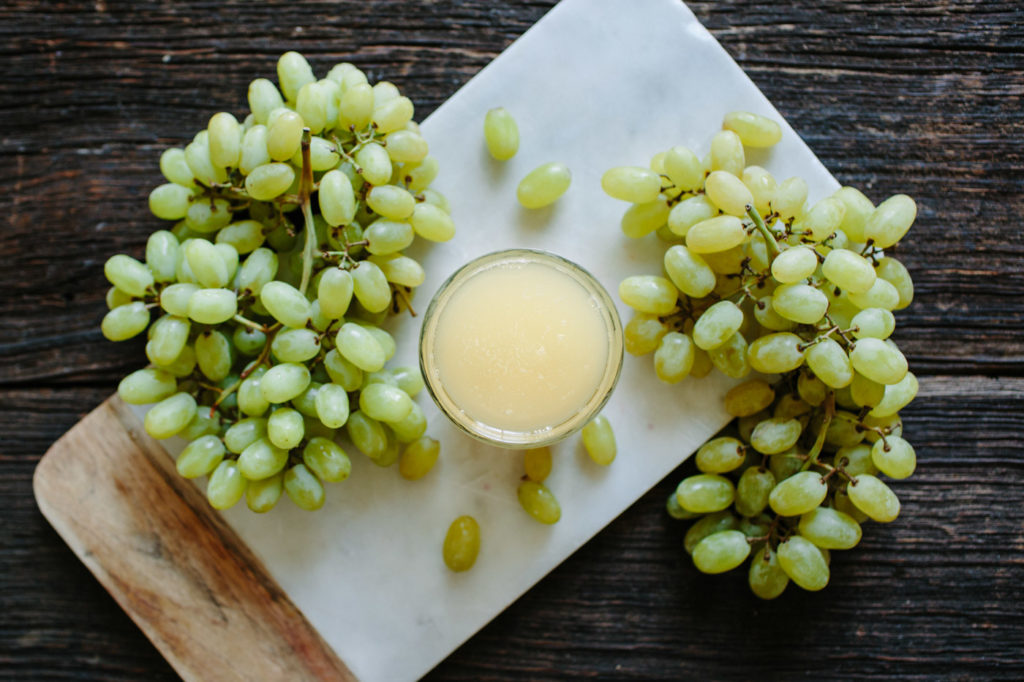
Faith in intuition and unbending passion have helped the business evolve from a simple stall to a national success story. They’ve gone from selling 70 bottles a month in 2012 to over 500,000 per week in 2016. But beyond staggering numbers, there’s a story of three virtuous people setting out to do something good––and there has been a sweet ripple effect. California’s farmers now have one of their largest purchasers of organic produce; Health-Ade is even collaborating with some to try to start America’s first organic ginger farm. Trout has not popped a single pill since his kombucha detox; he lives pain free. He and Slekys are now lovingly married and have brought into the world an absurdly cute and smily baby, Hendriks. As an avalanche of tear-jerking stories come from customers that attribute seismic shifts in their health to Health-Ade Kombucha, Dew feels nourished daily by the positive impact her company is having. Also, she bested her parents’ doubt––and what is the American dream, if not proving your parents wrong in a LeBron James-game-seven kind of way? Looks like their gut has led them a long way from the sidewalk on which this story began.
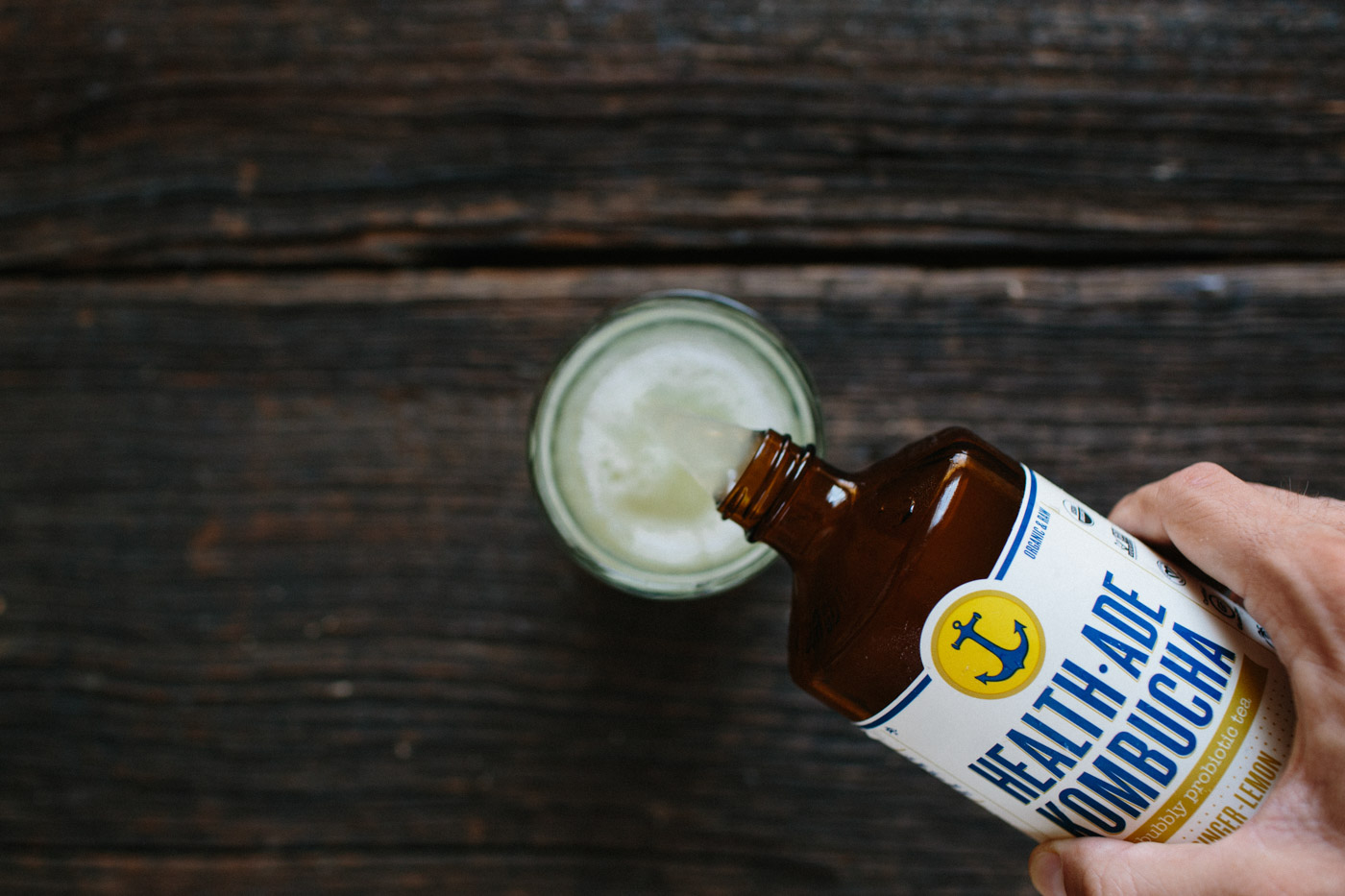





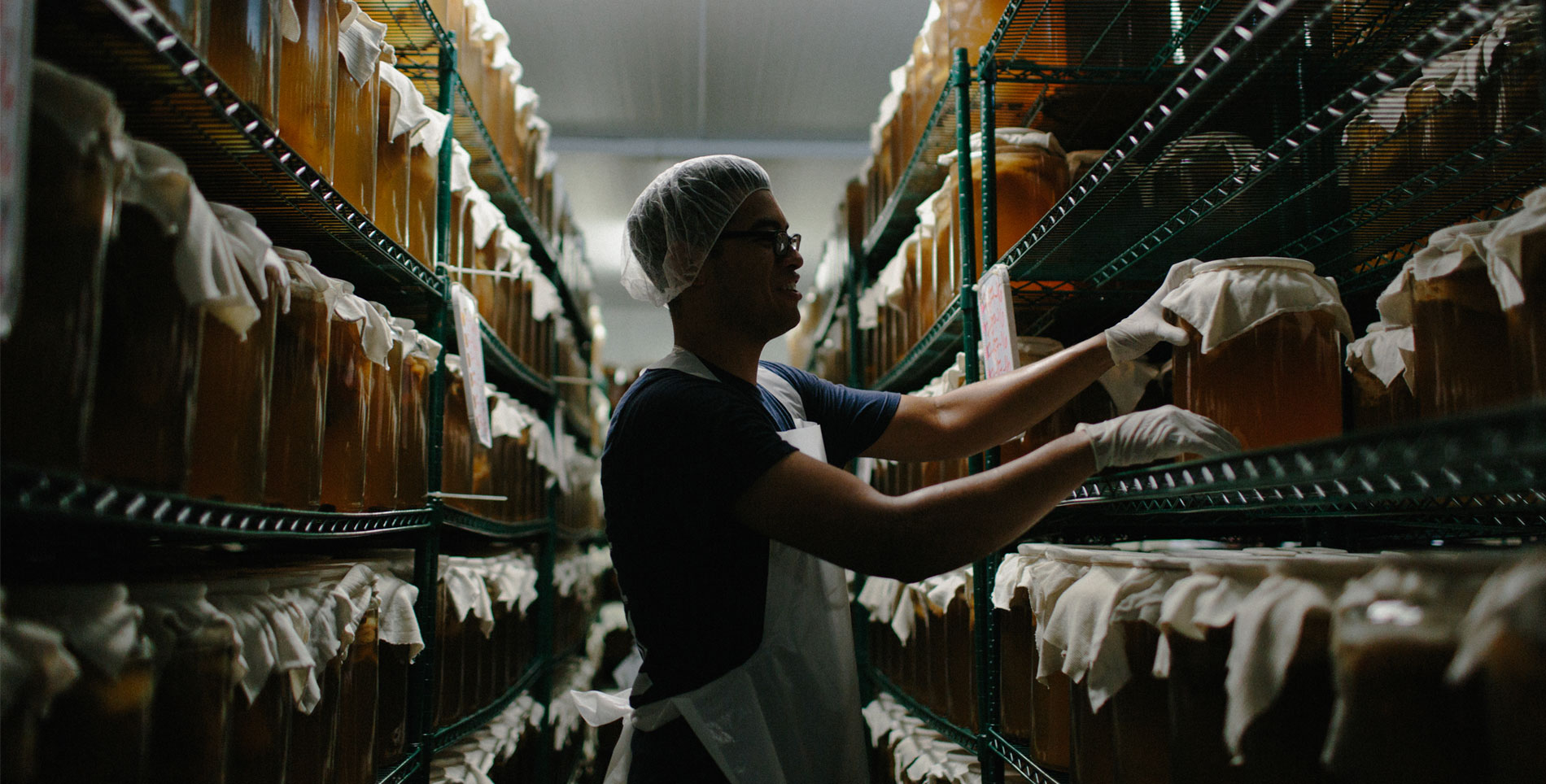

Our comments section is for members only.
Join today to gain exclusive access.